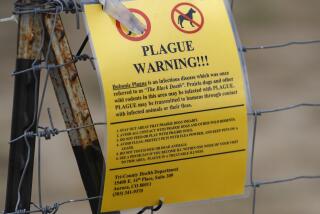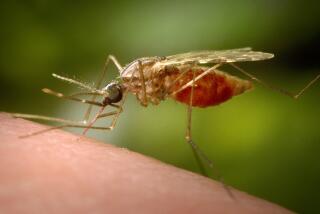Measures to Combat Parasite Risks : Watch what you eat and drink to avoid such diseases as giardiasis and amoebic dysentery.
- Share via
Sue Allison listened carefully as the tour director admonished her group not to eat anything but the meals provided during the seven-day riverboat trip from Peru to Brazil. The risk was illness transmitted through contaminated food or water.
Even though she followed instructions, the 50-year-old Santa Monica resident woke up on the third night of her trip with abdominal cramping and bloody diarrhea. No matter how much water she drank, she still felt thirsty. She was airlifted to a Peruvian hospital, where a doctor diagnosed amoebic dysentery, also called amebiasis. The diarrheal disease, caused by a tiny parasite called Entamoeba histolytica, is transmitted through fecally contaminated food or water in areas of poor sanitation. Allison’s doctor in Peru blamed tainted meat.
After taking several prescription medicines to kill the parasites, she felt better but not perfect. “It was six weeks before I felt normal,” Allison recalled recently. “Even then, I had fevers. It was a nightmare.”
Parasites such as the amoeba that ruined Allison’s trip can wreak havoc on travelers. However, the most common problems for travelers are posed by bacterial and viral diseases. “Those are the things they get most often,” said Dr. Steven R. Meshnick, a parasitologist at the University of Michigan School of Public Health. Yet parasitic diseases are also a concern for travelers, with the two most common probably being malaria and giardiasis, according to Meshnick.
“Giardiasis is probably the most common, but not as serious as malaria,” agreed Dr. Martin S. Wolfe, director of the Traveler’s Medical Service of Washington and a clinical professor of medicine at George Washington University Medical School.
However severe, parasitic diseases share some characteristics. The parasites satisfy their nutritional needs from the host’s blood, tissues or diet. Some parasitic diseases can have lengthy incubation periods, so travelers might be home before symptoms appear. But with a few simple precautions, travelers can shrink the risk of contracting parasitic ailments.
To avoid amebiasis, which is most commonly contracted in developing countries where there is poor sanitation, the Centers for Disease Control and Prevention advises following common-sense precautions when eating or drinking. Chlorine treatment alone might not kill the parasites that lead to amebiasis. The CDC recommends drinking only canned or bottled beverages and imbibing tea and coffee only if it is made with boiled water. Other caveats: Don’t eat raw food or drink unpasteurized milk.
Travelers should suspect amebiasis if they have diarrhea, fever and stomach pain. Immediate medical attention can speed recovery. Treatment with medicine to kill the parasites is generally effective within a few weeks. Most often prescribed are drugs such as metronidazole (Flagyl).
Another parasitic infection, malaria is most common in Central and South America, Hispaniola, sub-Saharan Africa, the Indian subcontinent, Southeast Asia, the Middle East and Oceania, according to CDC. “Eighty percent of the malaria in the world is in Africa,” Meshnick said. To minimize the risk, transmitted from person to person by the bite of an Anopheles mosquito, experts advise use of anti-malarial medicine, which should be started before a trip to hazardous areas. The drugs prescribed to prevent malaria depend on the destination of the traveler. One choice, chloroquine (Aralen), is not effective if the location is chloroquine-resistant, as a growing number of locales are classified. If so, mefloquine (Lariam) is recommended. And there are other medicines that can work as well, Wolfe said, such as doxycycline.
It is vital, experts agree, to confer with your doctor on your exact itinerary, and to follow the dose schedule exactly. Overdoses of anti-malarial drugs can be fatal, so it is particularly important to keep the medicines out of the reach of children.
Some people should avoid mefloquine, Wolfe warned. Among them: pregnant women, children weighing less than 30 pounds, people taking medication for psychiatric or epileptic disorders and those on certain cardiac drugs.
Avoiding mosquitoes is strongly advised, if possible. Those that transmit malaria often strike from dusk to dawn, making evening protection essential. “If you go out at night, wear long sleeves and long pants,” Meshnick said. “Wear DEET-based repellents, using less than a 100% concentration. Sleep with a bed net and curtains.”
If you are bitten and develop symptoms, seek medical attention immediately. Symptoms of malaria are flu-like, including fever, chills, headache and nausea. Fever may subside and return. Symptoms can occur as early as eight days after exposure, according to the CDC, or not until several months later.
“Standard treatment is a combination of quinine and tetracycline,” Meshnick said, but there is resistence to this treatment from malaria contracted in Southeast Asia, so other drugs are sometimes used as well.
Another treatment option that shows promise is an ancient Chinese fever remedy called artemisinin, which has been recognized in respected Western medical literature as an effective malaria remedy since 1979 and studied extensively since, according to Meshnick. Artemisinin is derived from the leaves of a tropical weed that can grow to 10-foot heights within six months, Meshnick said. In Meshnick’s study of 630 patients in Vietnam, the remedy eliminated all malaria parasites within 24 hours. It works twice as fast as standard treatment, said Meshnick, but artemisinin is not yet licensed for use in the United States.
Giardiasis is a less serious but much more common parasitic disease. It is often spread from consuming fecally contaminated water or food. “What typically happens is, campers go and drink from a stream or put in a chlorine tablet, which will kill bacteria but won’t do anything to giardia,” Meshnick said. “The best thing is to boil the water. But filtering gets rid of (giardia) too.”
Meshnick advises travelers to reverse their ideas of healthy food. “Say no to water and salads and opt for soda, beer and packaged foods. Anything green and uncooked could be contaminated with water.
The incubation period can be two weeks for giardia, so travelers may have already returned home when symptoms strike. They include diarrhea, stomach cramps, fatigue, gas, appetite loss, nausea and weight loss. Often the symptoms continue for more than five days.
More to Read
Sign up for The Wild
We’ll help you find the best places to hike, bike and run, as well as the perfect silent spots for meditation and yoga.
You may occasionally receive promotional content from the Los Angeles Times.






